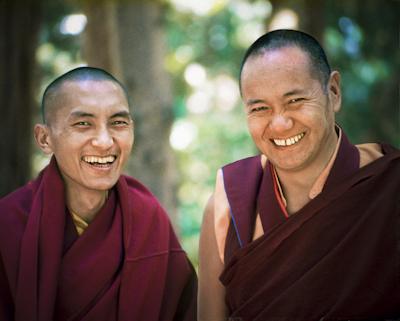Dear LYWA friends and supporters,
After what seemed a very short spring, we are firmly settled into summer here. No lazy summer days for us, though, as our team here continues to bring these precious teachings to the world in new and ever-changing ways! Read on...
NEW! LAMA ZOPA RINPOCHE AUDIO BOOKS
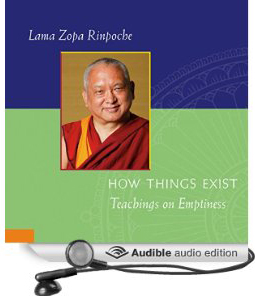 Last month we shared the news that LYWA has begun to offer audio books through Audible.com. We began with Lama Yeshe's Becoming Your Own Therapist and His Holiness the Dalai Lama's Illuminating the Path.
Last month we shared the news that LYWA has begun to offer audio books through Audible.com. We began with Lama Yeshe's Becoming Your Own Therapist and His Holiness the Dalai Lama's Illuminating the Path.
This month we are excited to announce two more audio books, this time presenting Lama Zopa Rinpoche's How Things Exist and How to Practice Dharma.
You can listen to five minute audio samples of all of these titles and even consider enrolling in a free trial membership.
May LYWA audio books help everyone make the most of every available second of this precious human rebirth.
KOPAN SERIES: CUTTING THE ROOT OF SAMSARA
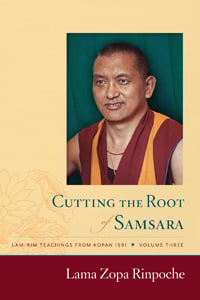 First was Practicing the Unmistaken Path, then Creating the Causes of Happiness, and now LYWA brings you Cutting the Root of Samsara, the third in a four volume series of Lama Zopa Rinpoche's teachings from the 24th annual Kopan lamrim course.
First was Practicing the Unmistaken Path, then Creating the Causes of Happiness, and now LYWA brings you Cutting the Root of Samsara, the third in a four volume series of Lama Zopa Rinpoche's teachings from the 24th annual Kopan lamrim course.
All four volumes in this ebook series are designed to transmit the immediate, spontaneous and intimate quality of Rinpoche's teaching style. In Cutting the Root of Samsara Rinpoche continues to engage us by presenting a clear discussion on sexual misconduct, an explanation of how karmic appearance and emptiness are intertwined and a multifaceted commentary on the eight Mahayana precepts motivation.
All three volumes are now available as ebooks everywhere! Click on the links above to view all the vendor links in our online store.
If you are an LYWA Member, Cutting the Root of Samsara is freely available to download as a pdf or in ebook format from our Members Area. And, if you want to read more Kopan course transcripts -- from 1972 up to 2010 -- you can find a list of all course transcripts on our website.
Read on for an excerpt from Cutting the Root of Samsara, offered as this month's eletter teaching.
MULTIMEDIA EBOOK: THE THREE PRINCIPAL ASPECTS OF THE PATH
LYWA is excited to have found a brand new tool that allows us to create the kind of multimedia ebooks that we have long envisioned. These multimedia ebooks weave the many resources of the Archive-- transcripts, images, audio and video-- into beautiful multimedia Dharma titles that deepen your experience of these precious teachings.
Check out our first multimedia title built on the Atavist platform and enjoy Lama Yeshe's powerful teachings on The Three Principal Aspects of the Path. The book can be accessed through any web browser that you like to use on your phone, tablet or computer, and the book will be perfectly formatted for each.
Kudos to our Ebook and Social Media Manager Megan Evart for creating these amazing books. Please check it out, and we welcome any feedback you have for us. We'd love to hear from you at [email protected].
ARCHIVAL VIDEO: ENTHRONEMENT OF YANGSI RINPOCHE
LYWA's Youtube channel is featuring an annotated archival clip filmed during the enthronement ceremony of young Yangsi Rinpoche at Kopan Monastery in 1975. The ceremony was presided over by Serkong Dorje Chang, Lama Yeshe, Lama Zopa Rinpoche and other lamas.
Yangsi Rinpoche is the reincarnation of Geshe Ngawang Gendun, one of Lama Yeshe's main teachers at Sera Monastery in Tibet. Rinpoche is currently serving as president and professor of Buddhist Studies at Maitripa College in Portland, Oregon.
DIGITAL DHARMA: THE PERFECT MIRROR
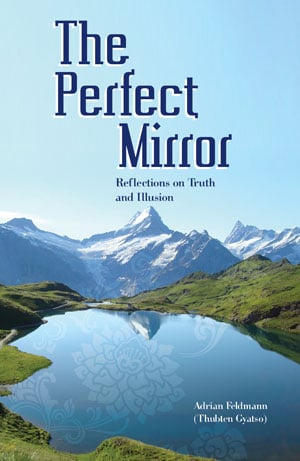 LYWA brings you Dharma from a Western perspective in this new ebook version of Venerable Adrian Feldmann (Thubten Gyatso)'s The Perfect Mirror - Reflections on Truth and Illusion.
LYWA brings you Dharma from a Western perspective in this new ebook version of Venerable Adrian Feldmann (Thubten Gyatso)'s The Perfect Mirror - Reflections on Truth and Illusion.
Venerable Gyatso was born in Melbourne, Australia, eventually making his way to Kopan Monastery. Finding himself ordained he was then asked by Lama Zopa Rinpoche to go to Mongolia and establish a new Buddhist centre there.
While in Mongolia Venerable Gyatso wrote this series of wonderful short Buddhist essays for the Mongol Messenger newspaper, exploring human topics such as anger, desire, loneliness and freedom through the clarifying lens of his own personal experience. You can view a video interview with Ven Gyatso on Vimeo.
This book is available through most popular ebook vendors, and the proceeds from the sale of this ebook will be going to Ven Gyatso’s monastery Thubten Shedrup Ling. It is also available to be freely downloaded by LYWA Members from our Members Area.
WEBSITE NEWS
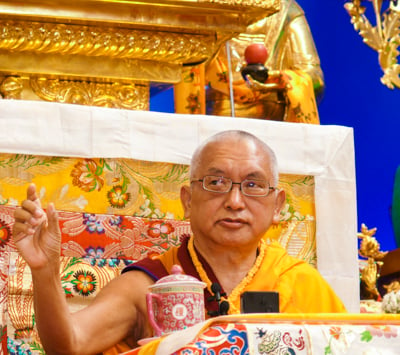 We have just posted a teaching from Lama Zopa Rinpoche on Thought Transformation in Daily Life. This is a public talk given in Geneva, Switzerland in July 1990 on the essential practice of mind training (lo-jong) with advice on how to use our problems to destroy the self-cherishing thought.
We have just posted a teaching from Lama Zopa Rinpoche on Thought Transformation in Daily Life. This is a public talk given in Geneva, Switzerland in July 1990 on the essential practice of mind training (lo-jong) with advice on how to use our problems to destroy the self-cherishing thought.
In other website news, we are nearing completion of our website redesign. We will not be posting any new content to the present site, and instead will focus our energies on getting the new site ready to be launched.
We are looking for 10-12 people to "test drive" the new site in the next month or so. If you are interested, please send an email to Jen Barlow. We welcome volunteers of all IT skills levels. We want our new site to be easy to use for everyone! Thanks in advance for your help.
THE DHARMA IN RUSSIA
In the next few days Lama Zopa Rinpoche will be in Russia giving teachings and a Medicine Buddha initiation, sponsored by FPMT's Ganden Tendar Ling Center. In celebration of this, they are preparing a Russian translation of Rinpoche's Heart of the Path, and we have also posted the Russian translation of Teachings From Tibet to our website. You can find a link to this and a number of other Russian translations of LYWA publications on our website here. You can see a list of all the languages into which LYWA books have been published on our website as well.
Thank you so much to all of you who offer your support to LYWA's mission. We rejoice in our work together to make these precious teachings available to everyone everywhere.
Much love, 
Nick Ribush
Director
THIS MONTH'S TEACHING: THE SELF-CHERISHING THOUGHT
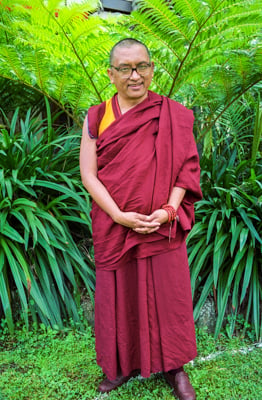 If the self-cherishing thought, the ego, is strong, then the attachment clinging to this life also becomes very strong. The stronger the attachment is, the easier anger arises. The happiness of the I becomes so important. In the view of the self-cherishing thought, the I becomes so important, so precious, therefore, my happiness becomes very important. My happiness and this life’s happiness becomes very important.
If the self-cherishing thought, the ego, is strong, then the attachment clinging to this life also becomes very strong. The stronger the attachment is, the easier anger arises. The happiness of the I becomes so important. In the view of the self-cherishing thought, the I becomes so important, so precious, therefore, my happiness becomes very important. My happiness and this life’s happiness becomes very important.
Anybody who does a small thing disturbs us so much. Even birds making a noise when we want to meditate or when we want quiet to have a sleep—even a dog or a bird making a noise outside, or somebody talking—even a small thing becomes a big disturbance. Even if the decoration of the house is slightly wrong in our view, how things are put on the table, how things are decorated—even just a little bit in the wrong way according to our point of view, it’s the wrong way—this becomes very important. There are things in the house put in a slightly different place than where we’d like them. The other person puts them in this place where we don’t want them to be, moving them from there, putting them here, here. It’s supposed to be there, but she moved it here. It’s supposed to be that way because we put it that way. Whatever it is.
Even a tiny mouse just going on the roof, making a little noise, just some noise, something we’re just able to hear, even a rat just quickly passing through the room. While we’re not expecting rats to run, it comes through. If we expected it, there’d be no problem. If we expected it, if we opened our mind toward rats, there’d be no problem. But if our mind is closed toward the rat, when we’re not expecting it, when we’re not wishing it, then the rat just quickly runs through, close to us, it becomes incredibly terrifying. Terrifying. Incredibly shocking. A big shock. There’s a rat in the house! A big shock! Immediately we want to move into another room or into another hotel where there’s no rat.
The stronger the self-cherishing thought is, the stronger the attachment to this life, so the worldly concern is there. In the view of that mind, the I becomes so important, my happiness becomes so important. This life’s happiness becomes so important, so when there’s a small disturbance, which is such nonsense to be worried about, it becomes a big upset.
Even a tiny thing, some small noise, the way the person looks at us, the way the person behaves to us, the way the person walks in front of us, or how the person passes in front of us, keeping the body like this. The way the person shows the body or keeps the body, with the eyes looking at us, completely screwed up tight or whether there are some wrinkles there. Whether there are some wrinkles around, stretching out the skin or completely tight when the person sees us.
Depending on this, what we do with these things, the changes to the skin, how we keep the eyes, big or fine or whatever. How the person passes us, or behaves or speaks or looks at us. Even the movement of the eyes. Even a small thing, with a movement of the mouth or with a movement of the cheeks or the shape around the mouth—if that person doesn’t behave the way we like, if the person doesn’t behave exactly the way we like, if the person doesn’t do exactly what we expect, what the self-cherishing thought expects, what attachment expects, then it becomes a huge upset. If that person doesn’t do exactly what we wish, it becomes a great upset, a great unhappiness. It causes a great depression.
The stronger the attitude is like this, the more important first my own happiness is, then the happiness of this life becomes that much more important. We make it so important because of these attitudes, the self-cherishing thought and attachment. Then it becomes so important that everything should be exactly how we want it. Our mind, these wrong conceptions, the self-cherishing thought, attachment, all this makes it so important. Everything we see, all the five sense objects we experience have to be exactly how we want them—it’s so important—and when they are not we are so unhappy.
Of course, it’s difficult for everything to be exactly how the self-cherishing thought wants. Nothing can ever be exactly like that all the time. For it to happen exactly like that all the time is difficult. What happens instead is, since we care so much about even a tiny thing, even small problems become a distraction. Even a small thing has to be exactly what the self-cherishing thought, what the attachment, wants, so when things don’t happen that way, when they’re not exactly according to our own self-cherishing thought and attachment, almost everything becomes a distraction. Almost everything becomes an enemy to us. People, animals, material objects and even places, because they’re not exactly how we want them to be, they become a kind of enemy, the cause of anger or of unhappiness.
What blocks people from becoming our friend is the self-cherishing thought. The stronger our self-cherishing thought is, the stronger the attachment, worldly concern, and therefore the more difficult it becomes for people to like us. From this wrong attitude, because whatever action we do is a selfish act, it becomes uninteresting, unpleasant, even harmful to others. How we act becomes harmful to other sentient beings. Especially when they see our attitude, it becomes painful. That’s why people don’t want to become our friend, or if we manage to make a friend why it doesn’t last. This is also because of the self-cherishing thought, this attachment, this strong clinging to this life. It’s what makes everyone become our enemy; it’s why we don’t get along with anyone.
Wherever we go, East or West, whether we live in a city or in the countryside, whatever company we keep or whoever we live together with, there’s so much disharmony, so many disasters. We’re always experiencing so many problems, always receiving so much harm. Even if we live alone, having this attitude creates so much loneliness. The stronger the selfish, self-cherishing thought, the stronger the attachment clinging to this life is, the more suffering of loneliness.
Conversely, the less self-cherishing thought, the less attachment clinging to this life there is, there’s less loneliness, there is less depression. There’s more peace, more happiness, more success in the life.
Excerpted from the 24th annual Kopan Course, 1991. Read more in Cutting the Root of Samsara, the 3rd volume in the 4-volume ebook series of Rinpoche's teachings from this course.
























